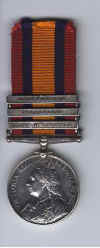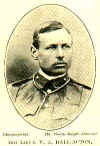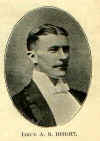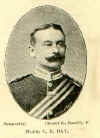Officers who died in the Boer War
1899-1902
extracted from The "Last Post" being
a roll of all officers (Naval, Military or Colonial) who gave their lives for
Their Queen, King and Country, in the South African War, 1899-1902. by Mildred
G. Dooner. J. B. Hayward & Son. 1980. Further information and photographs of
Officers submitted by Barbara
Patulak of Seymour, Ct from "The
Oxfordshire Light Infantry in South Africa 1900-1901".

Queen's South Africa Medal (obv)
Clasps shown – Paardeberg, Driefontein, Relief
of Kimberly
|

Ball-Acton. - 2nd Lieut. Vere Annesley
Ball-Acton, was killed in action Feb. 18th, 1900, near Paardeberg. He was the son of Mrs.
Ball-Acton, Brooklands, Hemel Hempstead, Herts, born in 22nd April, 1879, and educated at
Rugby. He entered Sandhurst September 1897, and passed out in December 1898.
He was gazetted to the 1st Battalion as 2nd Lieutenant, on the 11th Feb., 1899, and embarking with the 1st
battalion for South Africa in Dec., 1899, was present at the relief of Kimberley and the
action at Klip Drift. He was present at the attack on Cronje's rear-guard at
Klip Kraal on the 16th February, and was shot through the head at the
battle of Paardeberg on the 18th, when within a few hundred yards of
Cronje's laager. Like his two brother officers, he found a soldier's grave
by the side of the Modder River, being buried by a funeral party of
Canadians, near whose shelter-trenches he had fallen. When killed he was entitled to the medal with four clasps. His death
is mentioned in the despatch of F.-M. Earl Roberts of Feb. 28th, 1900, from Paardeberg.
|
|

Bright. - Lieut. Ashley Rowland Bright, 1st
Batt., was killed in action near Paardeberg, Feb. 18th, 1900. He was the son of G. Bright,
Esq., 25, Victoria Square, Clifton, was born 3rd Nov., 1872, educated at Winchester, and
entered the Oxfordshire Light Infantry from the Militia as a2nd Lieutenant
on 12th Dec., 1894, being promoted lieut. 17th Nov., 1897; appointed
Assistant-Adjutant 1st Battalion, 18th February 1898. Lieut. Bright first served in Natal with the Ladysmith Relief Force, and was
afterwards present with his battalion at the action at Klip Drift and the relief of
Kimberley. At the time of his death, he was entitled to the medal with five clasps,
including one for the relief of Ladysmith. His death is mentioned in the despatch of F.-M.
Earl Roberts from Paardeberg, of Feb. 28th, 1900.
In the autumn of 1899 he proceeded to South Africa with the Durham
Light Infantry, to which he was attached, in order to take command of the
Maxim gun detachment. With them he was actively engaged until the arrival
of his own Regiment, to which he was then transferred for duty, taking
part in the invasion of the Orange Free State and the subsequent
engagements, in command of a Company. He was shot dead through the heart
on the 18th February at the battle of Paardeberg, and his loss was deeply
felt by the whole Regiment.
He was an officer of great ability and much promise, and his Commanding
Officer wrote of his death in the following words - "Poor Bright - I
deeply regret his death, for he was an excellent officer, and a cheery,
intelligent companion. How he escaped being shot two days earlier, at Klip
Kraal, I cannot think, for throughout the day he was exposed to a perfect
hail of lead."
|
|

Day.-Major Charles Russell Day, Oxfordshire Light Infantry, died from wounds received in action near Paardeberg, on Feb. 18th, 1900, during the pursuit of Cronje. He was the only son of the Rev. Russell Day, rector of Horstead,
Norwich (Norfolk?), and Maria Isabella, eldest daughter of T. J. Knowlys,
Esq., of Heysham Tower, Lancashire, and was born 19th April, 1860, and educated at
Cheam School and Eton (Mr. Carter's). He entered the Oxfordshire Light Infantry from the 3rd Royal Lancashire
Militia, which he had joined in 1880, as a Lieutenant, 28th Jan., 1882, promoted capt.
27th July, 1889, and major 23rd Oct. 1899. He served for a few months with
the 2nd Battalion in Ireland, and was then transferred to the 1st
Battalion in India. He was Adjutant of Volunteers, 1892-97. In 1884-85 he
took part with his company in the operations for the suppression of the
Moplah Riots, SOuthern India, ans was severely wounded by a bullet in the
chest. Received the thanks of the Madras Government. Major Day was a fellow of the Society of Antiquaries, and was well known in the musical world. In 1890 he was employed in connection with the musical department of the Royal Military Exhibition at South Kensington, and in 1892 served as a member of the English Committee of the Vienna International Musical Exhibition; he also served in a similar capacity for the Paris Musical Exhibition of 1900. He was the author of "Music and Musical Instruments of Southern India and The Deccan." Major Day accompanied his battalion to South Africa in Dec., 1899, and was present at the fighting at Klip Kraal, where his field glasses were broken to pieces by a bullet. He also took part in the Relief of Kimberley; and at Paardeberg was struck down when going to the assistance of Corporal Knowles, who was wounded, and whose life he saved. After he had been wounded and while being attended to, Major Day's first thought was for the Corporal, adding "never mind me."
He is buried at Paardeberg; his funeral was most pathetic. Among many others attending were some thirty men of his battalion who had been wounded - a sad picture. One who was present adds "not many of us returned with dry eyes."
|
| Porter.- Major Reginald Whitworth Porter, D.S.O., 2nd in command of the 1st Batt. Oxfordshire Light Infantry, died May 10th, 1902, of valvular disease of the heart, on board the transport
"Orotava," in which he had been invalided home from South Africa. He was the eldest surviving son of Henry Aylmer Porter, Esq., of Cranbourne Court, Windsor Forest, was born in May, 1856, and educated at Cheltenham. He entered the Oxfordshire Light Infantry in Sept., 1876, being promoted capt. Jan., 1886, and major Nov., 1894. He served in the campaign on the North-West Frontier of India under the "ate Sir William Lockhart, 1897-98, with the 2nd Batt. of his regiment in the Mohmand Field Force, and with the Peshawur column and the 5th brigade of the Tirah Expeditionary Force, including the operations in
the Bara Valley, receiving the medal with two clasps. During the South African war he took part in the march from Modder River to Bloemfontein, and was present in the engagements at Klip Drift, Paardeberg, Poplar Grove, and Driefontein, and the occupation of Bloemfontein. He afterwards served in the O.R.C., and performed the duties of commandant of Reitspruit and Assistant Provost Marshal at Heilbron. He was appointed 2nd-in-command of his battalion from Sept., 1900, and served subsequently as Railway Staff Officer, and was mentioned in despatches,
London Gazette, Sept. 10th, 1901, being awarded the D.S.O. and the South African medal with four clasps and the King's medal with two clasps. Major Porter's name is inscribed on the Eleanor Cross Memorial erected at Cheltenham College to the memory of Cheltonians who fell in the war. |
Date last modified: 14 Nov 2003 20:18:07
|

